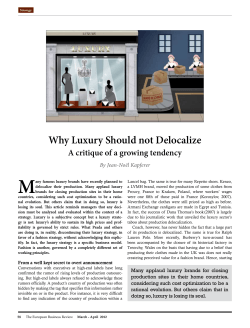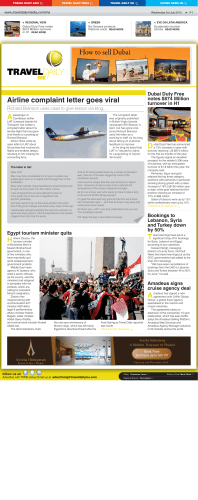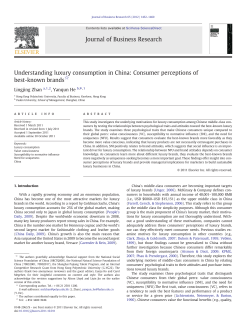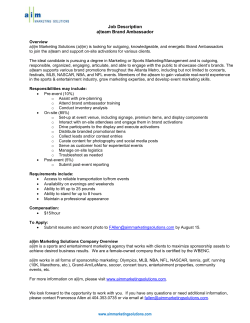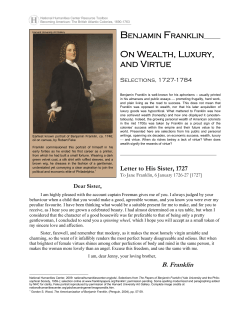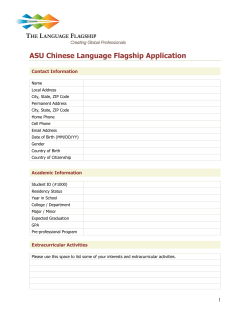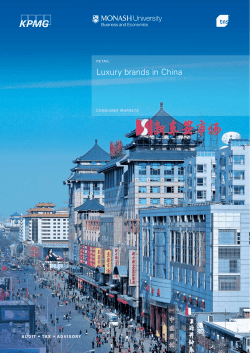
Burberry (BRBY:LSE) Recommendation : Equity Research
Equity Research EUTIC Burberry (BRBY:LSE) http://www.burberryplc.com/ Opinion: Hold Sector: Consumer Analyst: Daniel Stanoescu, Xida Zheng Price: 1294.84p 01/11/11 Recommendation: The luxury goods market, is expected to continue it’s growing trend for the forseable future. In the past few years, most players in this market, have been concentrating on the developing markets of China an India. According to the data that we have gathered on the Chinese consumer, we have found that from 2008 to 2010 it’s views of the luxury goods market have been changing. As the interest for internationally well known brands is growing, Burberry is slowly becoming a key player in this market. Compared to other luxury brands, Burberry has taken an aggressive stand and developed rapidly in these emerging markets while at the same time carefully identified the key elements that make these markets different. In the past year, more shops have been opened in these markets, and we’ve yet to harvest the potential profit that they generate. Burberry is the largest luxury goods company listed on the London Stock Exchange, and an analysis of the market performance has shown that it has a stead stock price and it’s not showing a lot of variation. Furthermore, comparing the stock with other players in the industry (LVMH, PPR) we’ve noticed that it has outperformed them while at the same time following the same patterns. The stocks of luxury goods are all affected about the same changes in the market, and the market predictions for these products is expected to increase. One other player on the London Stock Exchange that is specialised in luxury goods is Mulberry. It’s performance has been very good in the past 2 years, but the stock is usually more volatile, and small changes in the market are making a bigger impact to it’s share price than Burberry’s. Given the expansion plans that it has put in motion, the in detail research about emerging markets, and the changes that the brand has made to appeal to a wider audience without sacrificing the core values and quality of it’s products as well as considering the projected growth of the luxury goods markets in the foreseeable future, our recommendation is to hold Burberry. The share price we are expecting to see is 1800. Given our analysis so far, we believe that Burberry can achieve these projections. Company Description: Burberry Group plc is a holding company. It is a global luxury goods manufacturer, wholesaler and retailer. The Company designs, sources, and markets luxury men's, women's and children's clothing and non-apparel accessories globally through a diversified network of retail, wholesale, franchise and digital commerce channels worldwide. It also licenses third parties to manufacture and distribute using the Burberry trademarks. The Company's operates through its two channels to market, which include Retail/Wholesale and Licensing. On September 1, 2010, Burberry (Shanghai) Trading Co., Ltd took control of key store assets and inventory across 50 retail stores and daily operations at 43 of the stores were transproducts ferred to the Company. On January 31, 2011, the remaining seven stores had all transferred daily operations. During the fiscal year ended March 31, 2011 (fiscal 2011), the production of the local Spanish collection and related operations ceased. The main channel of distribution is Retail which now accounts to 64% of revenue (2010/2011) compared to 43% (2005/2006) because of the rapid expansion model that it’s currently undertaking. Considering the rapid and ambitious expansion in emerging markets such as China & India, the company sets to increase it’s revenue. Equity Research EUTIC SWOT Analysis: Strengths • • • • • • Rich experience. - Founded in 1856- accumulated culture, economies of scale, scope and knowledge curve that is rather difficult to copy. Superiority, Exclusivity and Recognition of the brand. - Burberry has incredible reputation in the world thanks to its heritage as the Royal Family primary clothes supplier, the high loyalty of its customers and numerous awards. Strong management team - flexible and good at managing uncertainty and difficulties. The management team has shown exceptional insight when dealing with difficult situations, such as the undesired brand recognition in the 1990’s. Presence - Burberry operates about 473 stores in 48 countries. The size of the company and brand, positive profits and generally successful performance means that it can cope with both internal and external disturbances Talents - Christopher Bailey-Design Director. Brilliantly known in a fashion world, a graduate of Westminster University, Royal College of Art used to work as a designer for Donna Karan and a Senior Designer for Gucci’s Women Wear. Since his arrival the label has earned a record $167 million in profits. Profitable Religion - In one of the interviews Chris Bailey was asked to describe Burberry in one word and his choice was “effortless”. High quality, elegant clothes which look and feel comfortable and effortless are likely to become an everyday addiction of those who surround themselves with luxury and a high-quality. This clearly positions the business as a company of a lifetime. Weaknesses • • • Rapid expansion - might cause a strategic overstretch and a loss of exclusivity of the brand The company is very dependent - on the creative talent of its current designer which makes it vulnerable. Additionally, tastes of the British designer might mismatch those of the foreign market’s (Chinese, for instance) customer. Outsiders - Company’s current management team consists of individuals from British and American background. Despite their rich experience and skills they might lack the ability and expertise of working in developing markets such as China due to cultural differences. Opportunities • Fast & Cool - Focusing on and investing in under-penetrated markets such as the USA, China, India the Middle East allows the company to become an aggressive first-mover in the market place which means accumulation of position within the market, market share, economies of scale and scope and a knowledge curve which is hard to imitate, copy or accumulate quickly for other firms alike. All those benefits in several markets mean high revenues and profits. • Aggressive expansion into China - aggressive take-over of a market share in the second largest market in the world. Check out Chinese consumer section below for more detail. Threats • Continuously worsening macroeconomic situation – With the ongoing debt crisis in Europe, Burberry's • • primary market, a major macroeconomic shock would have an adverse effect on Burberry's performance. The inflation problems that China, Burberry's main growth market, is facing also add to the pressure Culture shock - The Asian culture differs substantially from the European and American ones. Therefore, it is harder to manage and control the workforce and be able to reflect on the consumer’s tastes and demands. Severe competition - by many luxury brand designers. Chanel, Versace, LVMH, Armani, Vera Wang, Hermes, LVMH, YSL and many others are also increasing in stature in developing markets. Those houses of fashion are powerful enough to affect and shape the competitive environment by setting the trend and changing tastes. Severe over stretching might cause a loss in Burberry’s focus on exclusivity which might render it unable to remain on the same level with more narrow and luxury competition. Equity Research Chinese Consumer: China will account for about 20 percent, or 180 billion renminbi ($27 billion), of global luxury sales in 2015, according to a new McKinsey research. Even during the global recession in 2009, sales of luxury goods in the mainland rose by 16 percent, to about 64 billion renminbi— down from the 20 percent growth of previous years but far better than the performance of many other major luxury markets. Asia is projected to add roughly 1.66*m millionaires by 2015. As consumers in any developing economy (Russia, for example), Chinese customer’s association with a life success story is the ability to access luxury assets. This suggests a massive potential for a demand. During an interview with the CEO, the company revealed that it was heavily targeting the Chinese male consumers. As they make up more than half of the market, a tailoring service together with a larger range of non-apparel items have been included into Burberry’s portfolio. Building children's wear remains a key focus for the Group. Children’s wear was formally integrated into the global business in 2010/11, with the division now located in the Group’s London headquarters and its product aligned with core design and merchandising strategies. Given Chinese one-child policy and a famous “six-pocket syndrome” the company is highly likely to attract a wide range of customers. To get a better idea of the dynamics, McKinsey surveyed more than 1,500 luxury consumers in 17 Chinese cities in spring 2010. EUTIC Equity Research EUTIC Ratios: Burberry have exhibited a steady increase in Revenue, Earnings per Share and Dividends over the last 5 years. Estimates forecast a dividend growth to 24.88 in 2012, combined with an EPS growth to 61.35p and an increase in Revenue to 1,843mln, which seem consistent with Burberry’s performance and the growth prospects for the luxury sector. Equity Research EUTIC Market Analysis: Stock performance against FTSE 100 and LVMH Moet Hennessy Louis Vuitton SA During the period between January and September 2011 Burberry Group PLC outperformed most of its competitors, as well as outperforming the FTSE 100 by 36%, while at the same time moving in line with the overall luxury goods market. Citing its fiscal second-quarter sales results that beat estimates, Burberry is continuing to drive the growth in Asia developing markets.
© Copyright 2025









